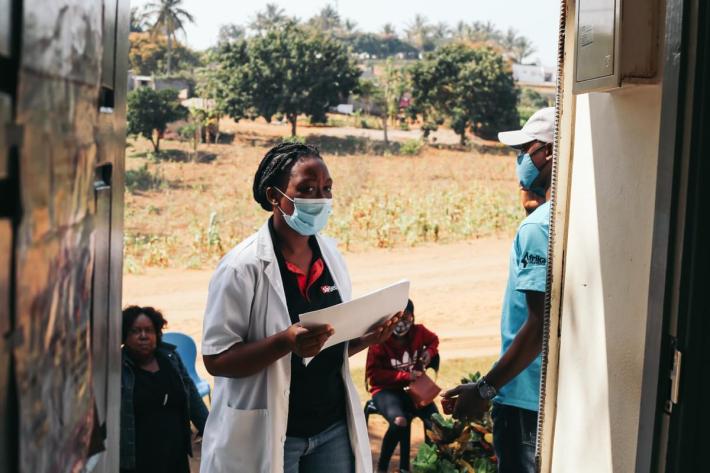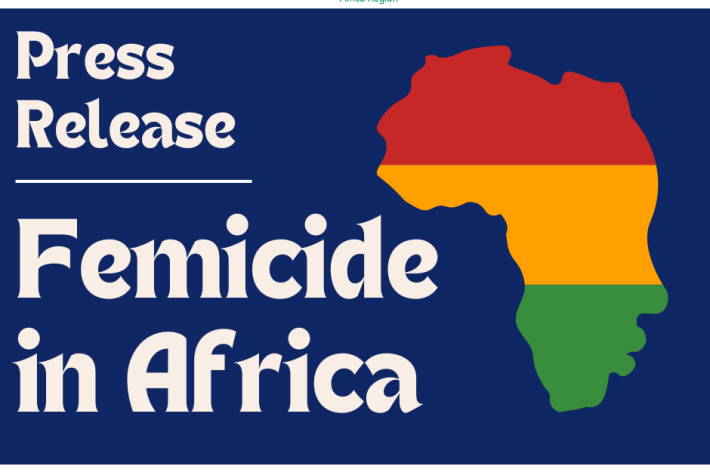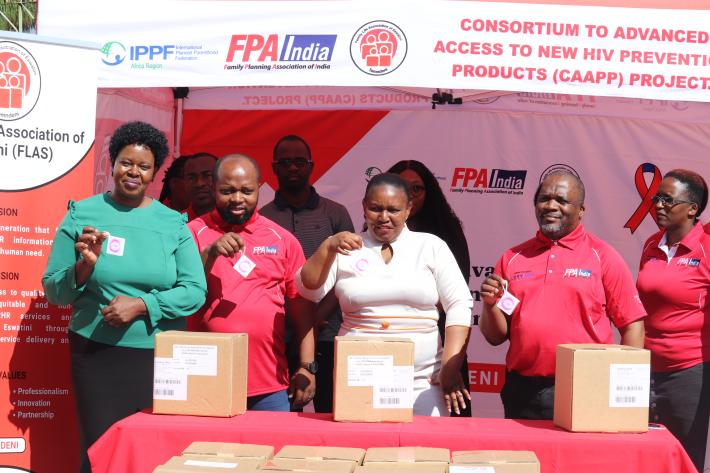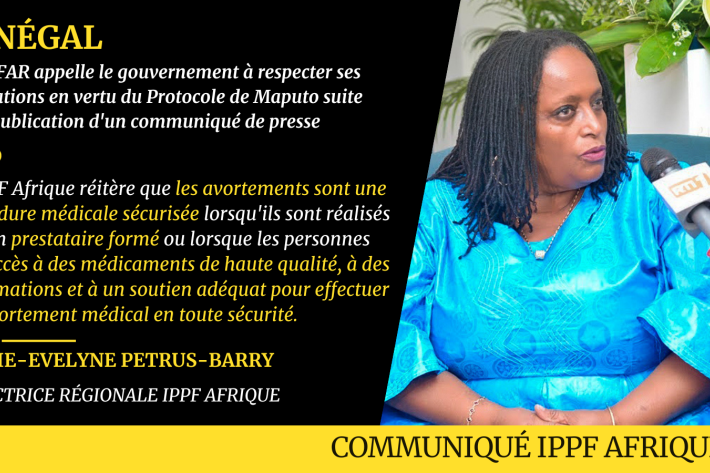Latest press releases
A selection of stories from across the Federation
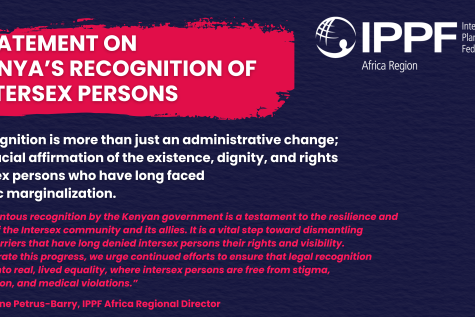
Kenya
IPPF Africa Region Welcomes Kenya’s Landmark Recognition of Intersex Persons
IPPF Africa Region Welcomes Kenya’s Landmark Recognition of Intersex Persons Nairobi, Kenya: 13 February 2025 – On 31 January 2025, Kenya has taken a groundbreaking step towards inclusivity and human rights by officially recognizing intersex as a sex marker alongside male and female in the Kenya Legal Notice 153 of 2025.


| 28 July 2022
World Population Day 2021: Increasing Effective Strategies for SRHR Information and Services (Focus on Malawi)
Sunday, 11 July 2021. As we commemorate the World Population Day with a projected 7.9 billion people on the planet today, our thoughts also turn to what were the reproductive needs and wants of women and girls in Africa during this extraordinary year and whether were they fulfilled. The COVID-19 pandemic has had devastating effects on the provision of health care services, including sexual and reproductive health (SRH) services, often more so in countries in Africa that are already struggling to keep up with normal preventative and curative services, let alone COVID-19 related morbidity and mortality. While fertility rates across the globe are shifting in both directions, and with Africa accounting for the top 23 highest total fertility rates (TFR)[1] in the world, the IPPF Women’s Integrated Sexual Health project (WISH2) provides SRH care to women, men and young people in 15 countries across the world - 12 of them being in Africa, including in fragile and conflict affected countries. The WISH2 program offers quality integrated and inclusive family planning and SRH services to marginalized and hard to reach populations: the poor, youth under 20 years and people living with disability. Within this framework, the WISH2 project recognized that many of these countries’ health services have been devastatingly affected by waves of the pandemic and adapted SRH services to ensure, wherever possible, continued access to SRH care to support women to achieve their reproductive intentions during the pandemic. In Malawi, we can focus in on young people against the backdrop of COVID-19 and a health system struggling to cope. Youth in Malawi face a myriad of challenges such as early marriages, unintended pregnancies, unsafe abortions, high new HIV infections, early childbearing, drug and alcohol abuse, high illiteracy rate, poverty, and HIV and AIDS pandemic. (NSRHR Policy 2017–2022). While young people make up the largest and fastest growing proportion of population in Malawi with 51% of the population below 18 years, access to SRH care remains low among Malawian youth with 41% of adolescent women aged 15–19 having an unmet need for modern contraception. A Family Planning training in Lilongwe, Malawi, by Family Planning Association of Malawi (FPAM). As the world celebrates population day, the Family Planning Association of Malawi (FPAM), which is IPPF's Member Association in the country, has increased effective strategies for providing access to information and SRH care to youth, including persons living with disabilities throughout the pandemic in the country. Some of these strategies include; Training of youth leaders to conduct peer learning programs and training of health care providers in Youth friendly services. Establishing youth friendly spaces at service delivery points. Conducting awareness creation and demand for SRH services to youth including conducting dialogue sessions, and engaging on WhatsApp and other social media platforms like Facebook. Sensitizing parents and guardians to create an enabling environment for youth to access SRH services. Coordinating with the Malawi Council for people with disabilities (MACOHA) - a government agency - to increase access to SRHR for persons with disabilities. Community Reproductive Health Promoters sensitization on engaging with young people with disabilities in the community. Use of the growing mobile phone market in Malawi as a new avenue for reaching young clients by working with a local mobile service operator to promote SRHR messaging on the 3-2-1 platform (a free to use mobile subscription app). These strategies can be found in full here. “Our work complements Government efforts. Through the WISH project and other projects, FPAM has been able to reach out to young women particularly in the hard-to-reach areas with SRH information and services which otherwise could not be available if FPAM was not present in those areas”, said Donald Makwakwa, Executive Director at the Family Planning Association of Malawi. A community training activity by FPAM. In this coming year, despite reduced funding, the project will aim to continue maintaining its innovative adaptations to support access to quality SRH services and rights for women and men living in the most difficult of circumstances. Joyce Ayong, IPPF Board of Trustee member and President of the Youth Action Movement (YAM) at the Cameroon National Planning Association for Family Welfare (CAMNAFAW) highlighted the importance of youth outreach and inclusion especially in the most difficult of circumstances. “We campaign for the cause of young people so that they are taken into account. Young persons with disabilities and youth living in hard to reach areas also need to access SRH care and information and it is our duty to continue to find ways to provide these lifesaving services to them”, said Ayong. The WISH2 program will continue to find adaptive strategies ensuring that the much-needed SRH care in some of the hardest hit countries by the pandemic is delivered to the most marginalized, leaving no one behind when it comes to family planning needs. About the Women’s Integrated Sexual Health Project 2 The Women’s Integrated Sexual Health (WISH) programme offers quality integrated and inclusive family planning and sexual and reproductive health services to marginalized and hard to reach populations: the poor, youth under 20 years and people living with disability. WISH is the UK Government’s flagship programme to support integrated sexual and reproductive health and rights (SRHR) services in a range of countries across Africa and Asia by 2021. The International Planned Parenthood Federation (IPPF) manages the WISH programme through a consortium arrangement (Lot 2) with 10 IPPF Member Associations and hand - picked partners chosen for their expertise to maximise access and reach for people in 15 countries: Development Media International (DMI), Humanity and Inclusion UK (HI), International Rescue Committee (IRC), Marie Stopes International (MSI), and Options Consultancy Services (Options). The countries are: Afghanistan, Bangladesh, Burundi, Ethiopia, Madagascar, Malawi, Mozambique, Pakistan, Somalia, South Sudan, Sudan, Tanzania, Uganda, Zambia, Zimbabwe. For more updates on our work, follow IPPF Africa Region on Facebook, Twitter, Instagram and You Tube. [1] Total Fertility Rate 2021 (worldpopulationreview.com)











